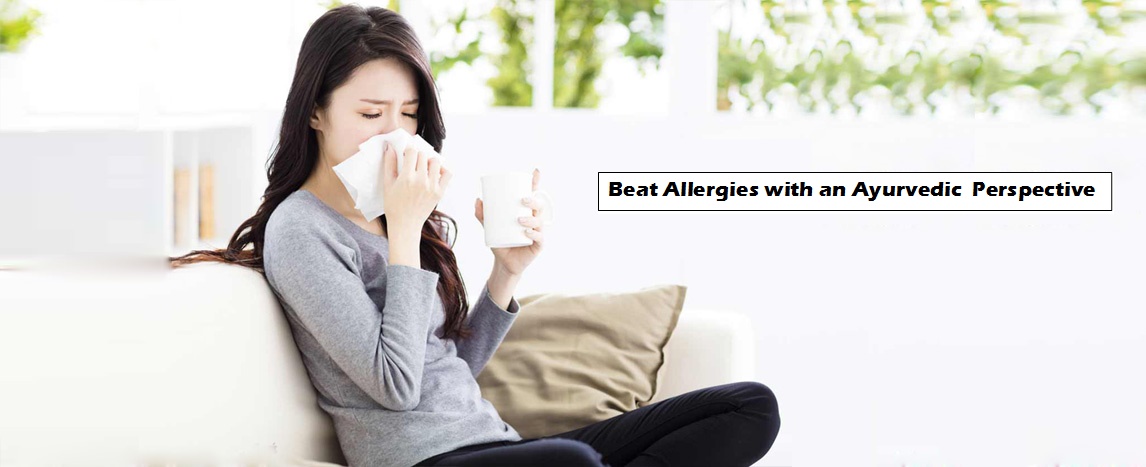Allergies are not fun to handle. They spell out discomfort for those of us who already suffer from allergies.
So, what are Allergies?
According to Ayurveda—an allergy is the result of an allergen- aggravating a specific Dosha: Vata, Pitta, or Kapha.
Ayurveda describes allergies according to dosha, depending on which one gets triggered in any given case. The pitta-predominant individual is likely to develop a pitta type of allergy, whereas a Kapha-predominant individual is likely to suffer from a Kapha type.
Let’s understand the three types of allergies identified in the Ancient Ayurvedic—
*Vata-Type Allergies
Vata types of allergies are commonly experienced in the digestive tract and include symptoms such as burping, gastrointestinal discomfort, gurgling intestines, abdominal pain, wheezing, headache, sneezing, sciatica, muscle spasms and other Vata-type discomforts.
Vata imbalances can cause food sensitivities to –raw foods, many beans (black beans, pinto beans etc.), and some animal protein, like pork.
–Balancing Vata
When Vata is aggravated, it is essential to slow down, keep warm, stay hydrated, and eat a Vata pacifying diet. Vata type of allergies often gets better with the intake of ginger or liquorice teas with an added drop of ghee. As the place of Vata is in the colon, one very effective therapy for balancing Vata-type allergies is a Dashamula tea enema.
*Pitta-Type Allergies
Pitta type of allergies usually occurs when the allergen comes in contact with the skin, slowly entering the blood. Pitta-type of allergies is often skin-based reactions such as itching, allergic dermatitis, eczema, rashes and may also involve bloodshot eyes. Pitta allergies can also cause heartburn, acid indigestion, stomach issues, nausea, or even vomiting.
Pitta can cause food sensitivities to hot spicy dishes, citrus fruits, tomatoes and fermented foods.
–Balancing Pitta
For Pitta type of allergies, it is advisable to eat a Pitta pacifying diet. Natural formulas that specifically support the blood can also be beneficial– a mixture of Manjistha and Neem. Mix one-part Manjistha with one-part Neem; take ½ teaspoon of the mix in warm water three times per day, after meals.
*Kapha Type Allergies
Kapha type allergies are most likely to be a cause of pollen-based allergens. The symptoms include irritation of the mucous membranes, hay fever, colds, congestion, sinus infection, bronchial congestion, asthma, and even sleeping disorders. Kapha can cause food sensitivities to dairy products like milk, yoghurt or cheese.
–Balancing Kapha
It is good to keep warm and dry, stay active, and eat a Kapha friendly diet. Clarifying teas such as ginger, cinnamon, cardamom, etc., can help to eliminate excess Kapha. Using local honey as a sweetener helps to cleanse the system. Trikatu, in tablet form, can also be supportive. Besides, Punarnava very effectively clears excess Kapha from the chest and stomach, promoting proper fluid balance in the tissues.
Panchakarma is also a very effective means of clearing accumulated Kapha from the system.
Here are some useful ayurvedic approaches to help stop allergies—
* Use a Neti pot, with a weak saline solution and distilled water, to loosen up the heaviness of Kapha. This also helps remove allergens that may be sticking to the mucous membranes.
* Practice Nasya: Dab a little sesame oil with eucalyptus or camphor in each nostril about an hour after using the neti pot.
*Take Trikatu, a combination of black pepper, long pepper, and ginger, before meals to heat the Agni (digestive fire).
* Avoid cold foods and drinks, including dairy, wheat, meat and iced drinks, as they can slow down the digestion and dampen the Agni.
*Eat warm, light, natural, cooked foods that are easy to digest. Focus on fresh, organic vegetables and fruits. Cook vegetables with a little bit of ghee or olive oil to soothe the mucous membranes.
* Include ginger tea throughout the day, as it helps the digestive fire.
* Take Triphala tablets at night to help rid the body of excess toxins that can cause slow digestion. The Ayurvedic trio of Amalaki, Haritaki, and Bibtaki, derived from fruits, works to cleanse and strengthen the system.
* Exercise daily to help stimulate Agni and eliminate Ama.
At ‘The Madras Institute of Ayurveda, Chennai, treatments for various ailments are offered. This ancient system of medicine heals in a very natural and holistic way. Benefits of Ayurveda go way beyond just relief. Treatment type is customized and integrates the age-old traditions into a daily routine (Dinacharya) and seasonal routine (Ritucharya) to help cure and prevent recurrence of any illnesses.
Log on to www.miayurveda.org to learn more about Ayurveda and its beneficial treatments.


